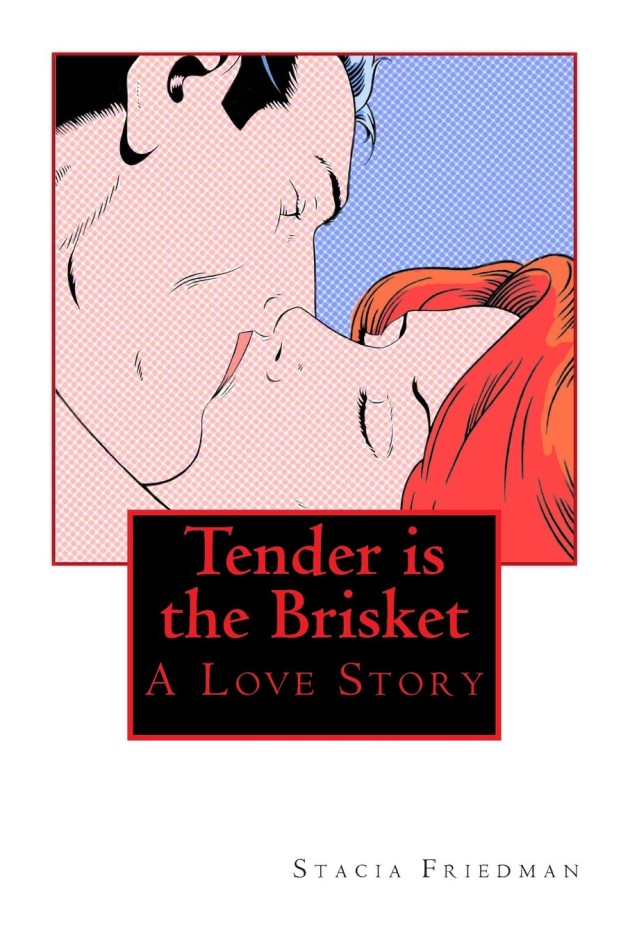The Lilith Blog 1 of 2
August 19, 2014 by Yona Zeldis McDonough
Tender is the Brisket
 Philadelphia-based humorist and freelance writer Stacia Freedman has a knack for one-liners and her snappy new novel, Tender is the Brisket, is peppered with them. The recession must have ended while I was on the crosstown bus, reflects one character. Adorable was the term Katya used to describe things that were too small for her, be they apartments, diamonds or men.
Philadelphia-based humorist and freelance writer Stacia Freedman has a knack for one-liners and her snappy new novel, Tender is the Brisket, is peppered with them. The recession must have ended while I was on the crosstown bus, reflects one character. Adorable was the term Katya used to describe things that were too small for her, be they apartments, diamonds or men.
The author of numerous feature articles and essays, Friedman has tried her hand at writing for film and television and pursued graduate studies in screenwriting. In Tender is the Brisket, as well as her earlier book, Nothing Toulouse, she hones in on women writers who are, in her description, “on their way up, down and sideways.” Lilith Fiction Editor Yona Zeldis McDonough recently caught up with her and her witty aperçus on topics as diverse as Jane Austen, Nora Ephron and The Lucy Show.
YZM: How did you made the leap from nonfiction to fiction?
SF: I actually started out as an aspiring TV and film comedy writer without any serious literary ambitions. I didn’t want to be Jane Austen. I wanted to be Nora Ephron. After five years in the “biz” in LA, I returned east and started taking freelance writing gigs. I wrote humor pieces for newspapers, features for magazines, anything that paid the bills. But I never gave up The Dream. I kept churning out comedic screenplays, plays and eventually novels. After all these years, it’s gratifying to discover that there is an appreciative audience for my style of social satire. And if one of my novels were to be adapted to TV or film? That would be fine!
YZM: Did working as a screenwriter help you as a novelist?
SF: My training as a screenwriter is a major influence on how I structure a novel. I don’t think in terms of chapters. To me, they are all “scenes.” It also impacts my preference for dialogue over narration. I have been told that my writing moves too fast, that I should slow down. I’m sure this comes from the basic rule of screenwriting, which is to keep moving FORWARD! And I had wonderful mentors when I studied screenwriting at UCLA, including Lila Garret, who wrote television comedies in the 1960s, including The Lucy Show, All in the Family and Maude.
YZM: Do you feel that Ruth Sheraton, the feisty, sassy, forty+ protagonist of Tender is the Brisket, is emblematic of many Jewish women of her generation?
SF: I think many women in my generation can identify with Ruth. She’s bright, successful, talented, attractive, sexy. But she’s still dealing with family issues that have been festering since childhood. No matter what she has achieved, it somehow isn’t enough. This is especially true for Jewish women over forty who are divorced, childless or never married. We carry this “shanda” inside us. At the same time, we are too independent to marry the dentist next door. Ruth represents all women – Jewish and gentile alike – who are progressive in their values but still haunted by the shadow of their mothers’ judgment.
YZM: Who was the inspiration for Ruth’s mother, Dolly?
SF: My mother was not only the inspiration for Dolly, she was the inspiration for the entire book. Caring for her while she suffered from dementia was extremely challenging and painful. However, it brought us closer together and gave me time to mend some old wounds. Writing Tender is the Brisket was very cathartic in that it enabled me to explore the humor and tenderness in our relationship. It also allowed me to express my personal feelings about institutionalizing our elders. We Boomers are first generation to embrace the surrealism of upscale nursing homes. I seriously doubt that anyone who has placed a parent in assisted living or a nursing home would choose it for themselves. Me? I’d rather fly to Paris and jump in the Seine, thank you.
YZM: What’s next on your horizon?
SF: I’m working on Hot Copy, a tongue-in-cheek mystery set in Philly. The protagonist is a young, novice reporter investigating the suspicious death of a paralegal found in the bathtub of a prestigious attorney. It deals with the Holy Trinity of big city life: sex, power and corruption. But hysterically.
YZM: Do you see a subversive or transgressive quality to female humor?
SF: Female humor doesn’t have to be subversive. But it sure helps. I believe that humor is based in pain or, at least, discomfort. Laughter is our relief mechanism. It is also healing and it can be persuasive, educational and even revolutionary. It is a way of bringing attention to things that are unjust in our society. God knows, our current Congress doesn’t get the joke.
 Please wait...
Please wait...